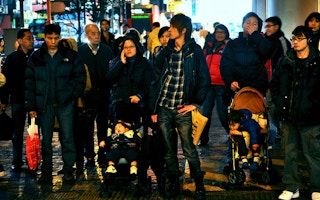Cities are getting smarter, but citizens are not always noticing improvements to their quality of life.
To continue reading, subscribe to Eco‑Business.
There's something for everyone. We offer a range of subscription plans.
- Access our stories and receive our Insights Weekly newsletter with the free EB Member plan.
- Unlock unlimited access to our content and archive with EB Circle.
- Publish your content with EB Premium.
This was one of the conclusions of a panel discussion on the topic of “Building smart, sustainable and liveable cities for the future” at the CSR Asia Summit in Hong Kong last month.
Jim Sheerin, the executive director of design and consultancy company Arcadis, said that cities are complex entities and that smart technology has an increasingly important role to play in helping make them sustainable. But they also need vision, integrated planning, good governance and leadership to help improve the quality of life of residents.
He pointed to the findings of Arcadis’ recently-released Sustainable Cities Index 2016 which showed that the average annual hours worked in cities such as Hong Kong and Singapore was 2,600 compared with 1,500 in Hamburg, Germany.
Delegates from Hong Kong, the host country of the event, agreed that the intense work culture did not seem to be relaxing.
Carine Lai, project manager for Civic Exchange, a Hong Kong-based public policy think tank, commented on the different aspirations, expectations and frames of reference from citizens of Hong Kong, Shanghai and Singapore.
Citing the think tank’s “Asian Urban Wellbeing Indicators” study, Lai showed the different aspects of life that mattered most to residents of each city.
“
‘Digital Rajasthan’ is a powerful platform to realise that vision. We envision Rajasthan as a role model for digital transformation for other states to follow.
Vasundhara Raje, Chief Minister, Rajasthan
Housing and medical care were areas that respondents from all three countries cared deeply about.
Hong Kong and Shanghai residents were also concerned about education, whereas Singapore residents were more concerned with work and business opportunities.
Lai also pointed out that Singapore and Shanghai residents seemed relatively happy with their cities, whereas Hong Kong residents showed the biggest gaps in satisfaction, particularly in areas such as housing, government, education and environmental protection.
Lai commented on the frames of reference for the study, pointing out that Shanghai residents were likely comparing their expectations to other cities in China and Singapore residents likely had other Southeast Asian cities in mind, while Hong Kong residents were perhaps thinking of other countries in the rest of the world.
Smart cities infrastructure is not just for the wealthy and developed nations.
Sandy Walsh, director of the Social Innovation Group of Cisco Asia Pacific and Japan, presented a case study for a smart cities project in Jaipur, India.
The project used internet-based systems along with lighting and environmental monitoring, surveillance centres and kiosks to enable citizens, tourists and government agencies to better access, manage and disseminate information about their city.
This resulted in substantial efficiency improvements for government services, including a reduction in corruption as well as a safer and better city experience for residents and visitors.
Vasundhara Raje, the Honorable Chief Minister of Rajasthan who was the driving force behind this project, said:
“My vision for the state is to digitally empower every citizen to enhance the quality of life, enable ease of doing business in the state and become an innovation and knowledge hub of the country.
‘Digital Rajasthan’ is a powerful platform to realise that vision. We envision Rajasthan as a role model for digital transformation for other states to follow”.










